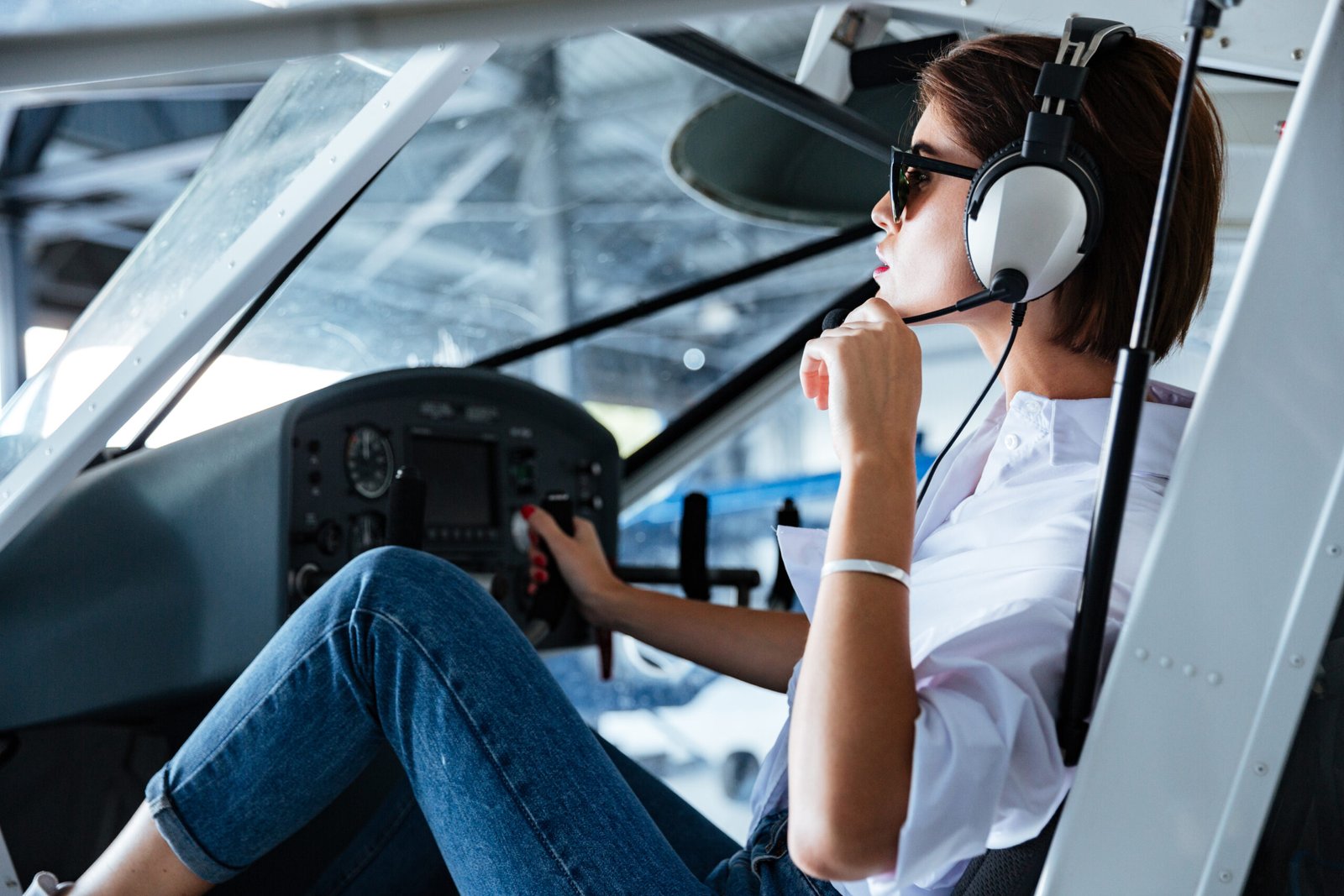Green Aviation
Flight Paths: How Aviation Is Shaping a Sustainable Future
As we soar into the future, aviation stands at the crossroads of innovation and sustainability. With a growing emphasis on eco-friendly practices and technology, aspiring aviators can find numerous educational pathways to prepare them for this dynamic industry. Whether you’re interested in becoming a pilot, aircraft mechanic, or air traffic controller, there are various aviation schools that cater to different aspirations.
*Types of Courses Offered in Aviation Schools**
Aviation education is incredibly diverse. At its core, you’ll find programs ranging from traditional flight training to specialized courses:
1. **Pilot Training Programs**: These are designed for those who dream of flying commercial or private planes. From private pilot licenses (PPLs) to airline transport pilot licenses (ATPLs), students learn everything from basic navigation to advanced flight maneuvers.

2. **Aircraft Maintenance and Engineering**: For those fascinated by the mechanics behind flight, these programs teach skills essential for maintaining and repairing aircraft. Students delve into subjects such as aerodynamics, propulsion systems, and aviation regulations.
3. **Aviation Management**: This track focuses on the business side of aviation—ideal for future managers or administrators in airlines or airports. Coursework typically includes operations management, financial analysis, and strategic planning.
4. **Air Traffic Control Training**: Air traffic controllers play a crucial role in ensuring safe takeoffs and landings. Specialized training prepares students for managing airspace effectively while maintaining safety protocols.
5. **Unmanned Aerial Systems (UAS)**: With drones becoming an integral part of both commercial and recreational flying, many schools now offer courses focused on drone piloting and applications.
The variety of options ensures that there’s something for everyone with an interest in aviation!
*Top Aviation Blogs & Websites**
In today’s digital age, staying informed about the latest trends in aviation is easier than ever! Here’s a list of some must-follow blogs and websites:
**Airways Magazine**: Offers news articles covering current events in airlines and airport operations.
**Flying Magazine**: A great resource filled with tips on flying techniques, aircraft reviews, and personal stories from pilots.
**AeroNews Network**: Provides updates on everything from legal changes affecting aviation to new technological advancements.
**FlightAware Blog**: Focuses on global flight tracking—perfect for enthusiasts wanting real-time information.
Social media platforms also serve as invaluable resources:
Join Facebook groups like “General Aviation Pilots” or “Aviation Enthusiasts” where members share experiences and advice.
On Instagram, follow accounts like @aviationdaily that showcase stunning aerial photography alongside industry news.
Twitter handles such as @AvGeekNation often tweet breaking news related to flights around the world.
These platforms foster communities that expand your knowledge while connecting you with fellow aviators!
*FAA Flight Schools & Simulators**
For anyone serious about pursuing a career in aviation within the United States, enrolling in FAA-certified flight schools is essential. These institutions ensure compliance with federal regulations while providing high-quality training environments.
Many schools offer state-of-the-art simulators allowing students to practice in realistic settings before stepping foot into an actual cockpit—an essential tool that enhances safety measures during initial training stages.
Whether you’re looking at local options or renowned institutions like Embry-Riddle Aeronautical University or Purdue University’s School of Aviation Technology—the world is brimming with opportunities tailored specifically for you!
The future of aviation leans towards sustainability—not just through cleaner technologies but through education as well! With various courses available across numerous platforms dedicated to sharing knowledge about this exhilarating field—it’s time to buckle up for an exciting journey ahead!
Soaring High: The Future of Sustainable Aviation
In a world increasingly focused on sustainability, the aviation industry stands at a pivotal crossroads. As technological advances and environmental concerns collide, the quest for greener practices in flying is more urgent than ever. But before we delve into the future of sustainable aviation, let’s explore how aspiring aviators can take flight through education, discover some fantastic resources within the aviation community, and understand the role of FAA-approved training.
*Aviation Schools: Types of Courses**
When it comes to aviation education, there are various pathways one might choose to become a pilot or work in related fields. Flight schools offer an array of programs tailored to diverse interests. For those aiming for higher altitudes, here are some common types:

1. **Private Pilot License (PPL)**: This foundational course allows students to fly solo or with passengers on non-commercial flights.
2. **Commercial Pilot License (CPL)**: Designed for those who wish to earn money as pilots, this course dives deeper into flight operations and regulations.
3. **Airline Transport Pilot License (ATPL)**: The pinnacle of piloting qualifications, this license is required for captains flying large passenger aircraft.
4. **Flight Instructor Certificate**: Graduates can teach others to fly while building hours towards their ATPL.
5. **Specialized Training**: Programs focusing on specific aircraft types or advanced maneuvers cater to enthusiasts wanting niche expertise.
Beyond piloting courses, many institutions offer degrees in aviation management, aeronautical engineering, and air traffic control—fields crucial for supporting sustainable practices across the industry.
*Aviation Blogs and Websites**
Navigating the vast skies of information about aviation can be daunting; however, numerous blogs and websites serve as guiding stars:
**Airways Magazine**: A comprehensive source covering news from around the globe including innovations in sustainability.
**The Points Guy**: Although primarily focused on travel rewards and tips, it often discusses eco-friendly travel options within airlines.
**Flying Magazine**: A staple in pilot circles that provides insight into both flying techniques and emerging technologies aimed at reducing carbon footprints.
**Simple Flying**: Offers current news regarding airlines’ efforts toward greener initiatives.
Social media platforms also play an essential role in connecting enthusiasts with real-time updates:
Follow hashtags like #SustainableAviation or #GreenFlying on Twitter and Instagram for trending discussions.
LinkedIn groups dedicated to aviation innovation foster professional networking among forward-thinking individuals.
*FAA Flight Schools and Simulators**
For practical hands-on experience that supports theoretical knowledge gained from coursework, FAA-certified flight schools are indispensable. These institutions ensure rigorous standards meet safety protocols while providing quality training experiences.
Many top-rated FAA flight schools offer cutting-edge simulators that mimic real-world flying conditions without leaving the ground—an excellent option for honing skills safely. Some notable examples include:
1. **American Flyers** – Renowned for its comprehensive programs across multiple states offering personalized training paths suitable for every level of pilot aspiration.
2. **Embry-Riddle Aeronautical University** – Known globally as a leader in aerospace education with state-of-the-art simulators available to students pursuing diverse career avenues within aviation.
The journey toward sustainable aviation isn’t solely dependent on technology; it rests heavily upon well-trained professionals equipped with modern skills and knowledge about environmentally-friendly practices throughout their careers. By tapping into various educational resources available today—from specialized courses at flight schools to invaluable online communities—we can all contribute towards making our skies cleaner while soaring high into an exciting future!
Eco-Friendly Aviation: How the Industry is Tackling Climate Change
In recent years, the aviation sector has found itself at a crucial crossroads, balancing the demands of a booming travel industry with an urgent need to address climate change. As eco-consciousness rises among travelers and regulatory bodies alike, innovations in technology and education are paving the way for a greener future. This blog post explores how various aviation schools are shaping tomorrow’s pilots and engineers while highlighting essential resources for anyone looking to stay informed about developments in eco-friendly aviation.
Aviation schools today offer a diverse array of courses designed to equip students with the skills necessary for this rapidly evolving industry. These institutions specialize in multiple areas including flight training, aircraft maintenance, air traffic control, and aviation management.
1. **Flight Training Programs:** Aspiring pilots can choose from private pilot licenses to commercial licenses, often incorporating advanced training on fuel-efficient flying techniques that minimize carbon footprints.
2. **Aircraft Maintenance Courses:** Understanding how to maintain aircraft sustainably is vital. Many programs now emphasize green practices in repair and upkeep.
3. **Air Traffic Control Education:** Training future air traffic controllers involves not just managing traffic but doing so efficiently to reduce waiting times and unnecessary emissions.
4. **Aviation Management Degrees:** These programs focus on sustainable operations within airlines and airports, equipping leaders with strategies for implementing eco-friendly policies.
To further enrich your knowledge about eco-friendly initiatives within aviation, numerous blogs and websites provide valuable insights into these transformative changes:
**The Air Current:** Focused on data-driven analysis, this site covers emerging technologies aimed at reducing environmental impacts.
**GreenAir Online:** A dedicated platform discussing news related to sustainable aviation fuels (SAFs) and innovative practices across the industry.
**Simple Flying:** A popular blog that regularly features articles on airlines’ sustainability efforts alongside updates on new fleet technologies.
Social media is also an excellent resource for staying connected with thought leaders in eco-friendly aviation:
On Twitter, follow accounts like @SustainableAvia for real-time updates on advancements in sustainable flying.
LinkedIn groups such as “Aviation Green Initiative” bring together professionals focused on environmental solutions within aerospace.
For those eager to turn their passion into action or simply explore potential career paths in aviation while being environmentally conscious, finding FAA-approved flight schools is essential. The Federal Aviation Administration (FAA) provides a comprehensive list of accredited flight training organizations across the country.
*Top FAA Flight Schools:**
1. **Embry-Riddle Aeronautical University** – Renowned for its commitment to innovation in aeronautics education and research.
2. **University of North Dakota** – Offers state-of-the-art simulators integrated into their curriculum focusing on efficiency and safety.
3. **Florida Institute of Technology** – Known for its cutting-edge programs that incorporate sustainability topics directly into pilot training.
Moreover, many flight schools are adopting simulation technology as part of their curriculum—a move that not only enhances learning but also conserves resources by reducing fuel consumption during initial training phases.
As we look towards the horizon of aviation’s future amidst rising environmental concerns, it’s clear that educational institutions play a pivotal role in shaping eco-conscious professionals who will lead this transformation. By investing time in understanding both traditional methods and innovative solutions within aviation education—coupled with following influential platforms—the journey toward more sustainable skies becomes increasingly attainable.
In conclusion, eco-friendly aviation isn’t merely an aspiration; it’s becoming an integral part of pilot training and industry practices worldwide. With ongoing advancements fueled by education and awareness, we can all contribute towards making our skies cleaner one flight at a time!

Soaring High: The Future of Sustainable Aviation
As the world hurtles toward a future defined by climate consciousness, the aviation industry is at a critical crossroads. With increasing pressure to reduce emissions and enhance sustainability, innovative solutions are emerging that promise to reshape the skies. But before we dive into these advancements, let’s explore the educational pathways leading aspiring aviators into this evolving field.
## Aviation Schools and Courses
Aviation education is diverse, catering to various interests and career aspirations. Here are some common types of courses found in aviation schools today:
1. **Pilot Training Programs**: These programs equip students with the necessary skills to become private or commercial pilots. They cover flight theory, navigation, meteorology, and hands-on flying experience.
2. **Aircraft Maintenance Technology**: Focusing on the mechanical aspects of aviation, these courses train students in maintaining and repairing aircraft systems. Graduates often pursue certification as Airframe and Powerplant (A&P) technicians.
3. **Aviation Management**: For those interested in the business side of aviation, management programs delve into airport operations, airline management, logistics, and regulatory frameworks.
4. **Air Traffic Control**: This specialized training prepares individuals for one of the most crucial roles in aviation—ensuring safe takeoffs and landings while managing airspace traffic efficiently.
5. **Flight Dispatching**: Dispatchers play a key role in flight operations by planning routes, managing fuel loads, and coordinating between pilots and ground services.
Each course not only opens doors but also fosters an understanding of how sustainability can be integrated into each aspect of aviation—from eco-friendly flight practices to efficient maintenance protocols.
## Essential Aviation Blogs & Websites
Staying informed about trends in sustainable aviation requires tapping into quality resources. Here’s a list of noteworthy blogs and websites dedicated to aviation enthusiasts:
**Airways Magazine**: Provides deep insights into airline news, aircraft reviews, travel tips, and developments within the industry.
**Flying Magazine**: A staple for both novice pilots and seasoned aviators offering articles on flight techniques alongside equipment reviews.
**The Air Current**: Focuses on breaking news about commercial aerospace with a keen eye on innovation—including sustainability initiatives.
**Aviation Week Network**: This platform covers everything from military to commercial sectors while emphasizing technology advancements aimed at reducing environmental impact.
Social media platforms also offer avenues for real-time updates:
Follow hashtags like #SustainableAviation or #GreenAviation on Twitter for discussions surrounding eco-friendly innovations.
Join Facebook groups focused on general aviation or pilot communities where members share experiences related to green flying practices.
LinkedIn hosts numerous professional groups dedicated to aerospace professionals exploring sustainability topics—ideal for networking!
## FAA Flight Schools & Simulators
The Federal Aviation Administration (FAA) certifies numerous flight schools across the United States that provide structured training aligned with regulatory standards. Notable options include known institutions like Embry-Riddle Aeronautical University or ATP Flight School offering comprehensive programs featuring simulators that replicate real-life flying conditions.

Flight simulators are game-changers in pilot training—they allow students to hone their skills safely without risking aircraft resources or incurring carbon emissions associated with actual flights. Many modern simulators incorporate advanced technology that mirrors realistic scenarios including weather variations and emergency procedures essential for developing adept pilots ready for sustainable practices.
As we look ahead at what lies beyond our current horizons—a commitment towards greener skies becomes imperative! With education paving pathways toward innovative solutions paired with emerging technologies in sustainability; it’s clear that our journey is just beginning!
Flying Green: How Aviation is Tackling Climate Change
As the world grapples with the pressing issue of climate change, the aviation industry stands at a crucial crossroads. While air travel has long been associated with significant carbon emissions, a wave of innovation and education is transforming how we think about flying. From new sustainable technologies to eco-conscious training programs, the aviation sector is actively working to reduce its environmental footprint. Let’s explore how aviation schools are adapting their courses, discover valuable resources in the field, and examine FAA-approved training options that emphasize sustainability.
*Aviation Schools: Types of Courses**
Aviation education has evolved significantly over recent years to address both traditional flying skills and emerging green technologies. Various types of courses are now available to aspiring aviators:
1. **Pilot Training Programs:** Traditional flight schools offer comprehensive pilot training that includes ground school instruction on aerodynamics, navigation, and regulations alongside practical flight experience. With an increasing focus on hybrid and electric aircraft, many programs are beginning to incorporate lessons on environmentally friendly flying practices.
2. **Aeronautical Engineering:** These courses cover aircraft design and technology with an emphasis on developing more efficient engines and lighter materials that reduce fuel consumption. Students learn about sustainable aviation fuels (SAFs) and their potential role in mitigating climate impact.

3. **Air Traffic Management:** This discipline focuses on optimizing flight paths using advanced technology to minimize delays and fuel usage during takeoff, cruise, and landing phases. Emphasis is placed on reducing carbon footprints while maintaining safety standards.
4. **Sustainable Aviation Programs:** Some institutions now offer specialized tracks dedicated entirely to green aviation technologies—teaching students about renewable energy sources for aircraft power as well as emissions reduction strategies.
*Essential Resources for Aviation Enthusiasts**
For those interested in staying updated on green initiatives within aviation or seeking knowledge beyond classroom walls, numerous blogs, websites, and social media platforms exist:
**Blogs:**
– *The Air Current* offers insights into current trends affecting the airline industry.
– *GreenAir Online* focuses specifically on sustainability in air transport.
– *FlightGlobal* provides news updates regarding technological advancements.
**Websites:**
– The International Air Transport Association (IATA) outlines global efforts toward achieving net-zero emissions by 2050.
– Sustainable Aviation Fuel Users Group presents research findings related to SAF development.
**Social Media Platforms:**
– Twitter accounts like @AeroTimeNews showcase breaking news stories related to eco-friendly initiatives.
– LinkedIn groups such as “Sustainable Aviation” foster discussions among professionals passionate about greener skies.
*FAA Flight Schools: Training for Tomorrow’s Pilots**
When selecting a flight school or simulator program approved by the Federal Aviation Administration (FAA), aspiring pilots should consider those integrating modern sustainability practices into their curriculum:
Many FAA-certified flight schools now provide simulator sessions that allow trainees to practice emergency scenarios in electric aircraft models or learn about fuel-efficient flying techniques without leaving a hefty carbon footprint behind.
Reputable institutions like Embry-Riddle Aeronautical University have begun offering degrees focused not only on traditional piloting but also include coursework centered around sustainable practices within aviation operations.
Ultimately, as the industry embraces greener alternatives—from innovative technologies in aircraft design to educational programs aimed at fostering environmentally responsible pilots—the future of aviation looks brighter than ever before. By investing time into understanding these developments through various resources, we can all become part of this crucial transformation toward sustainability in our skies!




